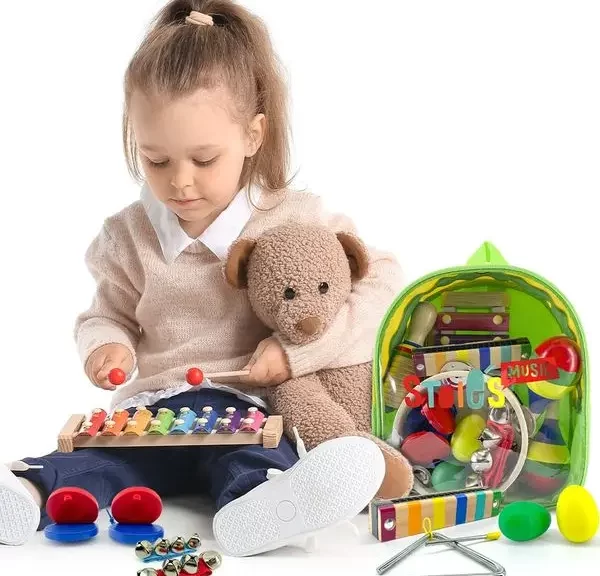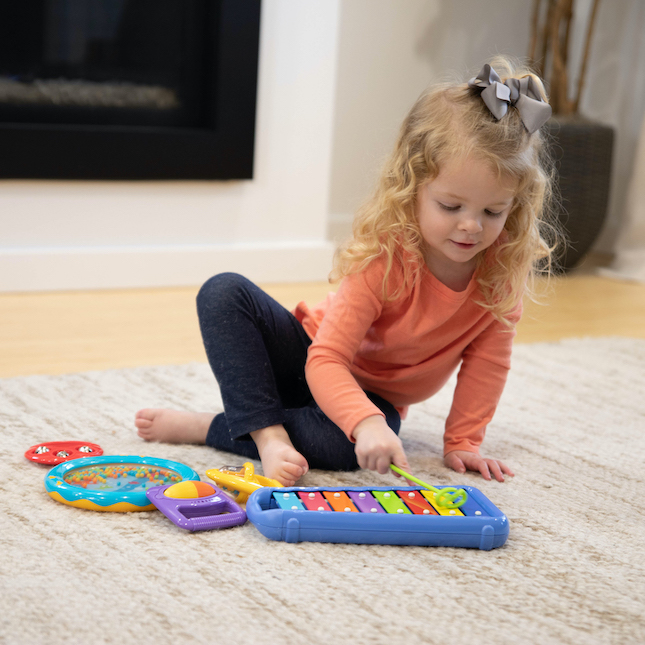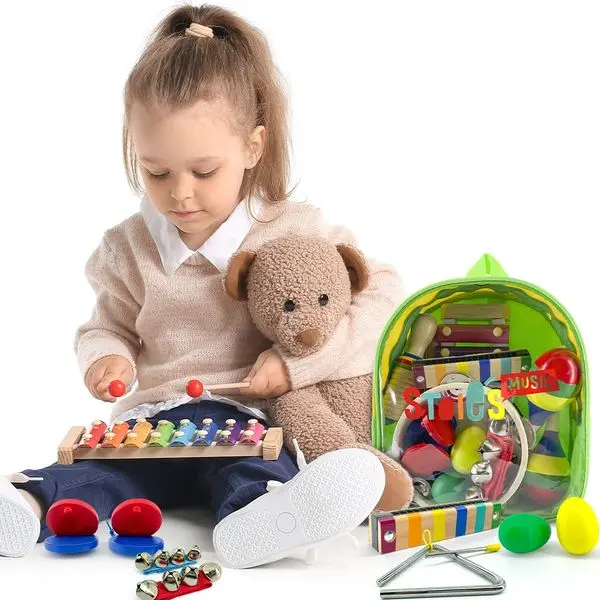Importance of Music in Early Childhood Development
The impact of music on early childhood development is profound and multi-faceted. Integrating music into a toddler’s daily routine can stimulate various aspects of their growth. From enhancing their ability to recognize sounds and words to fostering creativity, the benefits of exposing toddlers to music are vast.
Engaging toddlers with music toys can kickstart a love for music and sound exploration. These toys offer a hands-on experience that can support auditory development, as well as physical coordination. This interaction not only piques a child’s interest but also nurtures their natural rhythmic sense.
Music serves as a universal language, helping children connect with others and express themselves non-verbally. It lays the groundwork for social and emotional development by encouraging sharing, turn-taking, and cooperation when engaging in musical activities with peers.
Research has indicated that early musical exposure can influence brain structure by promoting neural connections. This enhancement in neural development is tied to improved skills in areas such as memory, attention span, and even mathematical abilities. Toddler music toys, therefore, are more than simple playthings; they’re tools that contribute to the cognitive enrichment of young minds.
In summary, music plays a critical role in early childhood development. It is essential to introduce toddler music toys early on to maximize their developmental benefits, while also sparking joy and creativity in young children’s lives.
Types of Music Toys for Toddlers
To enhance the developmental benefits discussed, let’s explore the types of toddler music toys available. Selecting the right type of musical toy can deepen a toddler’s appreciation for rhythm, melody, and sound.
Rhythm and Percussion Toys
Rhythm and percussion toys are foundational in teaching toddlers about beat and timing. These include drums, tambourines, maracas, and shakers. They are simple to use and can make a toddler feel like a real musician. Playing these toys fosters hand-eye coordination and motor skills.
Melodic Instruments for Kids
Melodic instruments introduce young minds to the world of melody and music creation. This category includes xylophones, mini keyboards, and toy guitars. They encourage toddlers to produce different notes and create simple tunes. These instruments help with auditory discernment and can boost creativity.
Electronic and Interactive Musical Toys
Electronic and interactive musical toys incorporate modern technology to engage toddlers. These toys often come with buttons to press, songs to play along with, and various sound effects. On top of giving sensory feedback, these toys can also teach music basics in a fun, interactive manner. Choosing suitable electronic toys can offer an enriched musical experience.
Benefits of Music Toys for Cognitive and Motor Skills
The use of music toys can significantly support a toddler’s cognitive and motor skills development. Here’s how:
Enhancing Memory and Attention
Toddlers often memorize songs and rhythms, which can bolster memory skills. Music toys that require children to follow sequences or patterns can train their attention span and improve focus.
Boosting Language and Math Skills
Engagement with music toys introduces basic concepts such as counting beats or following lyrics. These experiences lay the groundwork for language development and early math learning.
Fostering Motor Skills Development
Playing with rhythm and percussion toys, for instance, requires toddlers to coordinate their movements, which enhances their fine and gross motor skills.
Stimulating Creativity and Problem-Solving
Melodic instruments prompt toddlers to experiment with sounds, fostering creativity. They also encourage problem-solving as toddlers learn to manipulate the toy to produce desired musical notes.
Toddler music toys not only make learning enjoyable but also encourage a range of developmental benefits. From improving cognitive abilities to strengthening motor skills, these playful instruments play a crucial role in early childhood development. Introducing toddler music toys to a child’s playtime is not just about making music but about fostering an environment for growth and learning.
Safety Considerations When Choosing Music Toys
When selecting toddler music toys, safety is paramount. Here are crucial safety tips to consider:
Materials and Construction
Choose toys made of non-toxic, durable materials that can withstand rough handling. Avoid sharp edges and small parts that can be a choking hazard.
Volume Control
Ensure electronic music toys have volume controls to protect your toddler’s hearing. Loud noises can damage young ears.
Age Recommendations
Follow the age recommendations on toy packaging. They guide you to age-appropriate toys that are safe for your toddler’s developmental stage.
Battery Safety
If toys require batteries, check for secure battery compartments to prevent access by curious toddlers. Also, prefer toys with screw-secured compartments.
Inspect for Damage
Regularly inspect music toys for signs of wear and tear. Broken or damaged toys can pose safety risks and should be repaired or discarded.
Keeping these safety considerations in mind while choosing music toys will help ensure your toddler plays safely and gets the most out of their musical experiences.
Age-Appropriate Music Toys for Different Toddler Stages
Selecting age-appropriate music toys is key to a toddler’s development. As children grow, their interests and abilities change. Here’s a guide to choosing music toys for different toddler stages:
0-6 Months Old
At this stage, infants are exploring basic senses like hearing and touch. Soft music toys that play gentle lullabies are perfect. They should be easy to grip and safe for babies who might put them in their mouths.
6-12 Months Old
Babies start to understand cause and effect. Toys that make a sound when touched, like rattles or soft drums, are ideal. Look for bright colors to stimulate vision.
1-2 Years Old
Toddlers begin to walk and grasp objects. Simple instruments like handheld bells or shakers are suitable. These toys can encourage toddlers to move to the rhythm and improve their motor skills.
2-3 Years Old
At this age, toddlers enjoy more complex tasks. Simple wind instruments or toy pianos can spark an interest in melody. It’s also a good time for rhythmic toys that involve more coordination.
3+ Years Old
Older toddlers can handle more detailed musical play. Small guitars, beginner keyboards, or drum sets are fitting. They can experiment with creating their own music at this stage.
Choosing the right toddler music toys for each developmental stage is essential. It keeps pace with their growth and helps them reach new milestones. Make sure each toy is fun, engaging, and aligns with the child’s evolving abilities. Always remember safety and ensure the toys match the toddler’s age and skill level.
Encouraging Musical Exploration in Toddlers
Encouraging musical exploration is vital for a toddler’s development. Here are some ways to nurture their musical curiosity:
Create a Musical Environment
Set up a space where your toddler can explore music toys freely. Fill it with a variety of instruments like drums, xylophones, and shakers. Play music in the background to inspire them.
Join in the fun and play music with your toddler. This bonding experience can boost their confidence in trying new sounds. Take turns making rhythms and melodies together.
Encourage Creativity
Praise your toddler’s musical attempts, no matter the outcome. Encourage them to make up songs or tap out rhythms. Freedom to create keeps their interest alive.
Introduce Music Through Games
Incorporate music toys into game play. Games like ‘Simon Says’ with musical actions help toddlers enjoy music while they learn.
Use Music to Teach New Concepts
Sing songs about numbers, letters, or colors. Toddler music toys that involve counting beats or keys can be educational tools.
Include Music in Daily Routines
Make music a part of everyday activities. A morning song can start the day, while lullabies help wind down for bedtime.
By encouraging musical exploration with toddler music toys, you support your child’s desire to learn and grow. With the right encouragement and a safe environment, toddlers can develop a lifelong love and appreciation for music.
Tips for Integrating Music Toys into Daily Playtime
Incorporating toddler music toys into everyday play can be simple and effective. Here are some tips:
Choose the Right Time
Pick times when your toddler is most alert and interested. Maybe after a nap or meal.
Create a Music Zone
Designate a special area in your home where musical toys are easily accessible. This invites spontaneous play.
Incorporate Music into Routines
Sing with a toy guitar during dress-up time. Use a toy drum during cleanup.
Rotate Musical Toys
Keep interest high by switching out instruments. It encourages new ways of playing and learning.
Play Music Together
Hold a family jam session. It teaches sharing and can be a fun bonding activity.
Encourage Free Play
Let your child lead. They might surprise you with how they use the toys.
Set the Example
Occasionally, show how to play an instrument. It can guide and inspire them.
Use Music Toys as Rewards
Offer time with a musical toy as a reward for good behavior. It’s a motivator.
Bedtime Melodies
Wind down with calm music from a soft toy. It can signal the end of playtime.
By weaving music toys into your child’s day, you make learning through play a natural part of their life. Remember to be patient and let your child explore music at their own pace. The key is to make it fun!



